Resources
URBAL News

Journée de formation à l’approche URBAL – une évaluation qualitative et participative des impacts des innovations sociales sur la durabilité des systèmes alimentaires
Objectifs de la formation : acquérir les principes et connaissances de base nécessaires à la mise en œuvre de l’approche URBAL ; se familiariser aux outils participatifs d’URBAL en s’exerçant à leur utilisation.
La participation à la formation est gratuite, repas inclus.
Deux sessions : le lundi 5 décembre et le lundi 12 décembre 2022 dans le Campus de La Gaillarde à Montpellier.
Pour vous inscrire, merci d’indiquer la date souhaitée dans le formulaire suivant : https://forms.gle/3X4Tncm6koqoV1Dj9
Retrouvez toutes les informations et le programme de la formation dans le flyer téléchargeable.
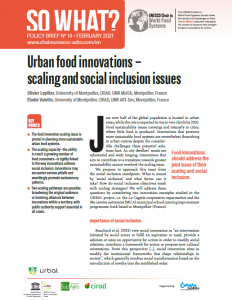
Find a new URBAL publication “Urban food innovations – scaling and social inclusion issues”. The authors of this policy brief are Olivier Lepiller (Cirad) and Élodie Valette (Cirad).
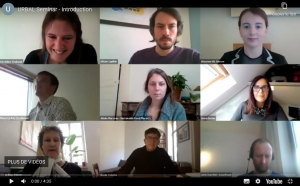
Seminar: Impact assessment of food innovations
Thursday, 11 February 2021 (videoconference)
This section presents the resources resulting from the Urbal project. These resources can be scientific or for different actors.
You can filter by resource type (scientific articles, internship reports, policy briefs, videos, etc.).
URBAL Guide Resources
Policy Briefs
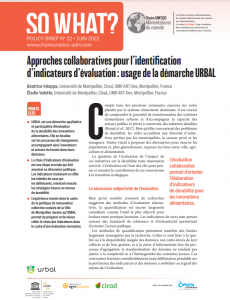
Beatrice Intoppa, Université de Montpellier, Cirad, UMR ART-Dev, Montpellier, France
Elodie Valette, Université de Montpellier, Cirad, UMR ART-Dev, Montpellier, France
Les points clés de ce So What ?
- URBAL est une démarche qualitative et participative d’évaluation de la durabilité des innovations alimentaires. Elle se focalise sur les processus de changement, accompagnant ainsi innovateurs et acteurs du terrain dans leurs décisions.
- Le choix d’indicateurs d’évaluation est une étape cruciale qui doit assumer sa dimension politique. Les indicateurs traduisent en effet les intérêts de ceux qui les définissent, orientant ensuite les stratégies futures en termes de durabilité.
- L’expérience menée dans le cadre de la politique de restauration collective scolaire de la Ville de Montpellier montre qu’URBAL permet de préparer et de mieux cibler le choix des indicateurs dans le cadre d’une évaluation normative.
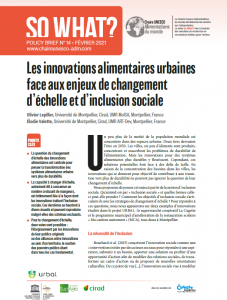
Olivier Lepiller (UMR MoISA, Cirad)
Élodie Valette (UMR ART-Dev, Cirad)
Les points clés de ce So What ?
- La question du changement d’échelle des innovations alimentaires est centrale pour penser la transformation des systèmes alimentaires urbains vers plus de durabilité.
- La capacité à changer d’échelle, autrement dit à concerner un nombre croissant de mangeurs, est intimement liée à la façon dont les innovations traitent l’inclusion sociale. Ces dernières se heurtent à divers écueils et peuvent reproduire malgré elles des schémas excluants.
- Pour le changement d’échelle, deux voies sont possibles : l’élargissement par les innovations de leur publics originels ou des alliances entre innovations au sein d’un territoire, le soutien des pouvoirs publics étant dans tous les cas fondamental.

Olivier Lepiller (UMR MoISA, Cirad)
Élodie Valette (UMR ART-Dev, Cirad)
Key points:
- The food innovation scaling issue is pivotal in planning more sustainable urban food systems.
- The scaling capacity—the ability to reach a growing number of food consumers—is tightly linked to the way innovations address social inclusion. Innovations may encounter various pitfalls and unwittingly promote exclusionary patterns.
- Two scaling pathways are possible: broadening the original audience or fostering alliances between innovations within a territory, with public authority support essential in all cases.
Academic Papers
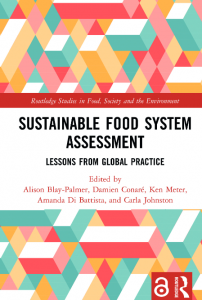
Abstract – In the last 20 years scores of projects have set out to better understand and measure dimensions of food system sustainability, as well as to review the assessment process itself, including the needs of stakeholders, their questions and areas of interest, and whether sufficient resources are available to conduct the research. Given the wide range in contexts, these sustainable food system assessment projects have multiple aims including to: support policy, increase resilience, better understand the state of food systems and provide benchmarks as the basis for future analysis, provide an evidence base for action, and/or bring about sustainable transformation. While conceptual framings, goals, methods, and outcomes vary between approaches, it is possible to tease out common processes. Our book documents and interrogates these processes from multiple scales and food system dimensions, including the development, application, and interpretation of a range of assessment tools.
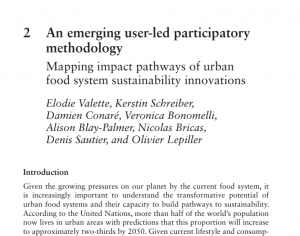
An emerging user-led participatory methodology
Abstract – This chapter presents an emerging effort to develop a participatory mapping methodology that will illuminate the pathways through which sustainable urban food systems achieve lasting impact. Carried out in collaboration with Està (Economia e Sostenibilità), the UNESCO Chair in World Food System (at Montpellier SupAgro), CIRAD (French Agricultural Research Centre for International Development) and the LCSFS (Laurier Center for Sustainable Food Systems), this initiative aims to provide an alternative to quantitative tools that lack precision at the local level, and to qualitative approaches holding a narrow focus that may obscure broader systemic dynamics. This URBAL project focuses on innovations in consumer practices, value-chains, and governance by examining 12 case studies in eight cities in the Global South and North.
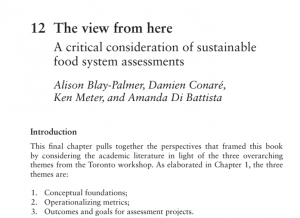
The view from here
Abstract – The chapter describes how the book adds to the literature and provides evidence and examples about how sustainable food systems can provide conceptual and operational foundations as well as goals and outcomes that support change. The processes and tools described in the book and the questions they raise can help address our most pressing issues including climate change, migration, and growing inequality. To do this, we need assessment processes and tools that reflect the realities of those most disadvantaged in households, communities, regions, and countries. By providing relevant assessment support, we can make decisions based on evidence that raises the voices of the people who need to be heard the most. At its best, a sustainable food system assessment process, as demonstrated by all the chapters in this volume, offers the potential to build capacity and bring transparency and clarity, in turn enabling a better use of resources and learning over time and across scales. They can also provide the basis for seeing how participation may need to change, measure change over time, enable strategy development, knowledge transfer, and inform transformative, coherent policy.
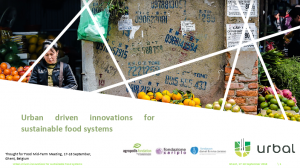
Valette E., Blay-Palmer A., 2018. Urban driven innovations for sustainable food systems, Conference Tropentag 2018, September 17 – 19, Ghent, Belgium
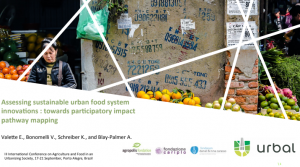
Bonomelli V., Schreiber K., Valette E., Blay-Palmer A., 2018. Assessing sustainable urban food system innovations : towards participatory impact pathway mapping, 3rd International Conference on Agriculture and Food in an Urbanizing Society, 17-21 Septembre 2018, Porto Alegre, Brazil
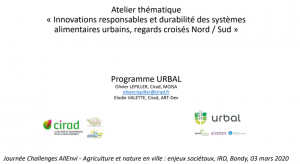
Lepiller O., Valette E., 2020. Innovations responsables et durabilité des systèmes alimentaires urbains regards croisés Nord / Sud, Journée Challenges AllEnvi Agriculture et nature en ville : enjeux sociétaux, IRD, 03 mars 2020, Bondy, France
Case Studies Resources
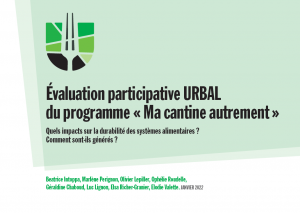
The application of the URBAL method to the “Ma cantine autrement” program made it possible to identify the impact pathways of 12 program activities on the different dimensions of sustainability. The results obtained were then reworked in collaboration with the Food Policy Department of the City of Montpellier (DPA) in order to link them to the program’s operational objectives, to establish the articulation with various normative benchmarks for assessing the sustainability of food systems and to identify or modify existing or future impact indicators for the 2020 assessment. This booklet presents the results of this collaboration.
B. Intoppa, M. Perignon, O. Lepiller, O. Roudelle, G. Chaboud, L. Lignon, E. Richer-Granier, E. Valette. JANVIER 2022
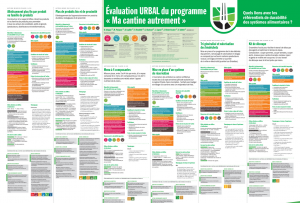
The application of the URBAL method to the “Ma cantine autrement” program made it possible to identify the impact pathways of 12 program activities on the different dimensions of sustainability. The results obtained were then reworked in collaboration with the Food Policy Department of the City of Montpellier (DPA) in order to link them to the program’s operational objectives, to establish the articulation with various normative benchmarks for assessing the sustainability of food systems and to identify or modify existing or future impact indicators for the 2020 assessment. This poster presents the results of this collaboration.
B. Intoppa, M. Perignon, O. Lepiller, O. Roudelle, G. Chaboud, L. Lignon, E. Richer-Granier, E. Valette. NOVEMBRE 2021
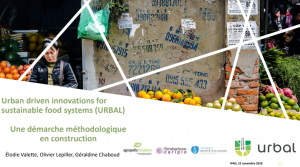
Valette E., Chaboud G., Lepiller O., 2018. Training in the Advanced Master IPAD (‘Innovations and Policies for Sustainable Food‘) in Montpellier, Institut des Régions Chaudes (SupAgro) – Module : assessments tools of sustainable food systems – URBAL
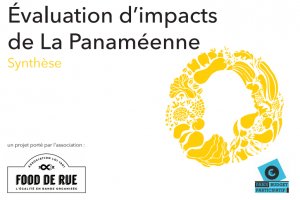
Sustainable food and socio-professional integration: a winning combination? This is the summary of the internship report produced by Marielle Martinez, Master student of IPAD (Innovations and policies for sustainable food systems) at Institut des Régions Chaudes.

Read the interview with Elodie Valette, URBAL project coordinator with Alison Blay Palmer. The aim of this project is to design a qualitative impact assessment methodology for food innovations in an urban context.
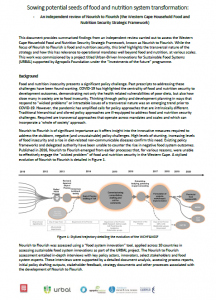
This document provides summarised findings of the assessment of the Western Cape Household Food and Nutrition Security Strategic Framework, known as Nourish to Flourish. This brief highlights the transversal nature of the strategy and how this has relevance to operational mandates well beyond food and nutrition, at various scales. This document was produced by Gareth Haysom (African Centre for Cities).

Sustainable food system innovations are multiplying around the world. In order to better understand these food innovations and how they influence the sustainability of food systems, multiple impact assessment methods have emerged. During the seminar, different evaluation methods will be presented through five projects:
· SHARE CITY and SHARE IT tool (Anna Davies and Alwynne McGeever)
· SYALINNOV (Pierre Leray)
· CosyFood (Joris Van Mol)
· URBAL (Élodie Valette and Olivier Lepiller)
· Sustainable Food Places (Alizée Marceau)

Valette E., Chaboud G., Lepiller O., 2018. Training in the Advanced Master IPAD (‘Innovations and Policies for Sustainable Food‘) in Montpellier, Institut des Régions Chaudes (SupAgro) – Module : assessments tools of sustainable food systems – URBAL

Sustainable food and socio-professional integration: a winning combination? This is the summary of the internship report produced by Marielle Martinez, Master student of IPAD (Innovations and policies for sustainable food systems) at Institut des Régions Chaudes.

Read the interview with Elodie Valette, URBAL project coordinator with Alison Blay Palmer. The aim of this project is to design a qualitative impact assessment methodology for food innovations in an urban context.

This document provides summarised findings of the assessment of the Western Cape Household Food and Nutrition Security Strategic Framework, known as Nourish to Flourish. This brief highlights the transversal nature of the strategy and how this has relevance to operational mandates well beyond food and nutrition, at various scales. This document was produced by Gareth Haysom (African Centre for Cities).

Sustainable food system innovations are multiplying around the world. In order to better understand these food innovations and how they influence the sustainability of food systems, multiple impact assessment methods have emerged. During the seminar, different evaluation methods will be presented through five projects:
· SHARE CITY and SHARE IT tool (Anna Davies and Alwynne McGeever)
· SYALINNOV (Pierre Leray)
· CosyFood (Joris Van Mol)
· URBAL (Élodie Valette and Olivier Lepiller)
· Sustainable Food Places (Alizée Marceau)

Valette E., Chaboud G., Lepiller O., 2018. Training in the Advanced Master IPAD (‘Innovations and Policies for Sustainable Food‘) in Montpellier, Institut des Régions Chaudes (SupAgro) – Module : assessments tools of sustainable food systems – URBAL

Sustainable food and socio-professional integration: a winning combination? This is the summary of the internship report produced by Marielle Martinez, Master student of IPAD (Innovations and policies for sustainable food systems) at Institut des Régions Chaudes.

Read the interview with Elodie Valette, URBAL project coordinator with Alison Blay Palmer. The aim of this project is to design a qualitative impact assessment methodology for food innovations in an urban context.
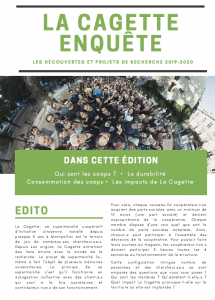
“La Cagette enquête” summarizes the researches carried out the collaborative supermarket. This document discusses (among other things) the work that URBAL has carried out within la Cagette. This document was written by Alicia Hardy (cooperator and intern at la Cagette).

This document provides summarised findings of the assessment of the Western Cape Household Food and Nutrition Security Strategic Framework, known as Nourish to Flourish. This brief highlights the transversal nature of the strategy and how this has relevance to operational mandates well beyond food and nutrition, at various scales. This document was produced by Gareth Haysom (African Centre for Cities).

Sustainable food system innovations are multiplying around the world. In order to better understand these food innovations and how they influence the sustainability of food systems, multiple impact assessment methods have emerged. During the seminar, different evaluation methods will be presented through five projects:
· SHARE CITY and SHARE IT tool (Anna Davies and Alwynne McGeever)
· SYALINNOV (Pierre Leray)
· CosyFood (Joris Van Mol)
· URBAL (Élodie Valette and Olivier Lepiller)
· Sustainable Food Places (Alizée Marceau)
This Master’s thesis is a literature review of the impact pathway methodologies. It was produced by Kerstin Schreiber, intern at Cirad and under the supervision of Elodie Valette.
This Master’s thesis aims to explore an articulation between the methodology of a participatory research project on sustainable food system innovations (URBAL) and the Milan Urban Food Policy Pact (MUFPP) monitoring framework. This works starts to link URBAL qualitative findings to external indicators in order to provide further information to a classic evaluation device. This document was produced by Beatrice Intoppa, intern at Cirad and under the supervision of Prof. Daria Quatrida (Università degli Studi di Padova) and Elodie Valette (Cirad).
The diagnostic step of « Ma Cantine Autrement (MCA) » UFIL started in January 2019 until May 2019. Its process included the assembling and research of different data on all the activities organized during « MCA » project. This report was produced by Amélie Wood, intern at Cirad and Master student at Université de Montpellier, under the supervision of Olivier Lepiller and Marlène Pérignon.
This report is focused on the workshop step of « Ma Cantine Autrement (MCA) » UFIL. Its process included the qualitative assessment of the impact of a school catering project on sustainability. This report was produced by Ophélie Roudelle, intern at Cirad and Master student at ISTHIA (University of Toulouse), under the supervision of Anne Dupuy, Olivier Lepiller and Marlène Pérignon.
This report is focused on the diagnostic analysis of La Cagette UFIL. Its process included the assembling and research of different data on all the activities organized at La Cagette. This report was produced by Justine Dahmani, intern at INRA and Master student of IPAD (Innovations and policies for sustainable food systems) at Institut des Régions Chaudes, under the supervision of Grégori Akermann and Olivier Lepiller.
This report is focused on the diagnostic and workshop steps of La Panaméenne UFIL. Its process included: 1) the assembling and research of different data on all the activities organized at La Panaméenne and 2) the qualitative assessment of the impact of this restaurant and grocery store on sustainability. This report was produced by Marielle Martinez, Master student of IPAD (Innovations and policies for sustainable food systems) at Institut des Régions Chaudes, under the supervision of Elodie Valette and Gauthier Hauchart.
This report summarizes the diagnostic step of « Cho nhà minh ». It is a public-private platform that connect urban consumers and suburban suppliers of safe and sustainable food in Hanoi. This report was produced by Michaël Bruckert (Cirad, Favri), Nguyen Thi Sau (Favri) and Nguyen Thi Tan Loc (Favri).
This report summarizes the diagnostic step of the DAM (“Distretto Agricolo Milanese”) and the metropolitan system of agricultural disctricts. They preserves the environment and the agricultural land of the metropolitan area of Milan. This report was produced by Valerio Bini (Università degli Studi di Milano) and Giacomo Zanolin (Università degli Studi di Milano).
This report summarizes the participatory workshop of « Cho nhà minh ». It is a public-private platform that connect urban consumers and suburban suppliers of safe and sustainable food in Hanoi. This report was produced by Nguyen Thi Tan Loc (Favri), Michaël Bruckert (Cirad, Favri), Nguyen Thi Sau (Favri) and Nguyen Hai Thanh (Cirad).
Urban-Driven Innovations for Sustainable Food Systems (Urbal) is an international project that develop for innovators, policy makers and funders a low-cost, easy to implement and context-adaptable methodology to map the impact pathways of urban food innovations on all food system sustainability dimensions.
La Cagette is a cooperative of consumers, non-for-profit supermarket in Montpellier. Co-members are all committed to work 3 hours per month and are the unique owners, decisions-makers and clients. Along with several employees, they ensure the operation of the supermarket.
The City of Montpellier launched a vast and ambitious project in 2016 to streamline its school catering system by promoting and developing sustainable food for children eating lunch in the city’s school canteens. This Ma Cantine Autrement (MCA) project is designed as an interactive system around four primary pillars: a purchasing policy, production management, meal distribution in school restaurants and sustainable development awareness.
An ecological and local farmers’ market has emerged at the initiative of a group of engaged consumers and producers. The farmers market happens every fifteen days since the beginning of January 2017. Since then, it is a meeting point for 20 producers and around 300 consumers.
The need of confidence about the products’ quality between consumers and farmers and among producers themselves has led to implement a participatory guarantee system (PGS).
A network of Chefs has recently implemented various actions in order to link food practices in Brasília with the issue of the Cerrado “socio-biodiversity” conservation. Specific plants of the Cerrado biome, harvested and processed by local communities, are used in gastronomic recipes by chefs who seek to strengthen the relationship between gastronomy and Cerrado’s sustainable development. Due to the political activity of the gastronomic actors, the consumption of native products of the Cerrado biome is growing in the restaurants of Brasília.
From 2017 Maizajo is a small tortilleria who is supplying restaurants in and around Mexico City with corn tortillas. While most tortillas sold in Mexico City are made from industrial flour mixes of hybrid corn varieties, Maizajo only sources native corn directly from small-scale farmers, connecting these farmers to the consumers. Moreover these traditional tortillas are produced using the pre-Hispanic process of nixtamalization (nixtamalización), that only allows to release the plant’s nutrients.
Food2rue aims to promote the economic rights of individuals currently excluded from the labour market by developing accessible and sustainable food innovations. Through the grocery store and restaurant La Panaméenne in Paris, Food2rue provides employment and entrepreneurial opportunities to women who are not currently included in the labour market.























